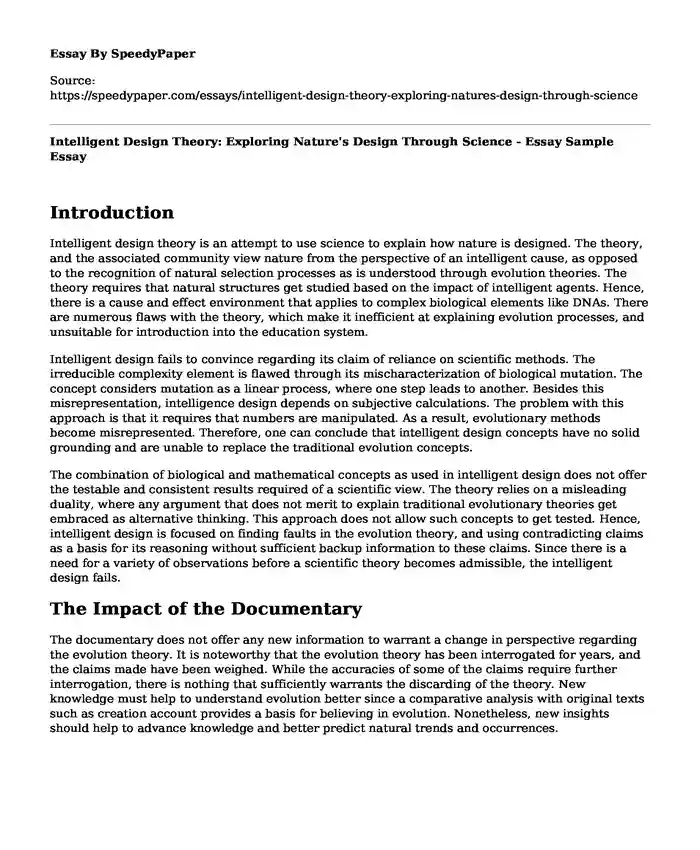Introduction
Intelligent design theory is an attempt to use science to explain how nature is designed. The theory, and the associated community view nature from the perspective of an intelligent cause, as opposed to the recognition of natural selection processes as is understood through evolution theories. The theory requires that natural structures get studied based on the impact of intelligent agents. Hence, there is a cause and effect environment that applies to complex biological elements like DNAs. There are numerous flaws with the theory, which make it inefficient at explaining evolution processes, and unsuitable for introduction into the education system.
Intelligent design fails to convince regarding its claim of reliance on scientific methods. The irreducible complexity element is flawed through its mischaracterization of biological mutation. The concept considers mutation as a linear process, where one step leads to another. Besides this misrepresentation, intelligence design depends on subjective calculations. The problem with this approach is that it requires that numbers are manipulated. As a result, evolutionary methods become misrepresented. Therefore, one can conclude that intelligent design concepts have no solid grounding and are unable to replace the traditional evolution concepts.
The combination of biological and mathematical concepts as used in intelligent design does not offer the testable and consistent results required of a scientific view. The theory relies on a misleading duality, where any argument that does not merit to explain traditional evolutionary theories get embraced as alternative thinking. This approach does not allow such concepts to get tested. Hence, intelligent design is focused on finding faults in the evolution theory, and using contradicting claims as a basis for its reasoning without sufficient backup information to these claims. Since there is a need for a variety of observations before a scientific theory becomes admissible, the intelligent design fails.
The Impact of the Documentary
The documentary does not offer any new information to warrant a change in perspective regarding the evolution theory. It is noteworthy that the evolution theory has been interrogated for years, and the claims made have been weighed. While the accuracies of some of the claims require further interrogation, there is nothing that sufficiently warrants the discarding of the theory. New knowledge must help to understand evolution better since a comparative analysis with original texts such as creation account provides a basis for believing in evolution. Nonetheless, new insights should help to advance knowledge and better predict natural trends and occurrences.
Evolutionary Principles and COVID-19
Evolutionary principles are essential in interrogating the progression of global calamities such as COVID-19, and how humans respond to them. Evolution posits that, for millennia, humans have been faced by natural pandemics that threaten their existence. Each time, only the fittest have survived. This principle applies to the COVID-19, as the world continues to battle the pandemic, there arise two sets of affected populations. Asymptomatic patients are those that do not develop the symptoms during the second set progress with the disease, with a high potential for death. One expects that, without a definite medication, only those who develop immunity to the disease will survive.
Conclusion
In conclusion, intelligent design is a new line of thinking that challenges the evolution theory by relying on intelligent observations about complex aspects of nature. However, it falls short in many respects, including its mischaracterization of biological mutation as taking a linear trend, and the introduction of a duality that only helps to discredit the tested evolution theory. Its flaws make it unsuitable for presentation to learners. Also, evolution theories can help understand the trend of COVID-19.
Cite this page
Intelligent Design Theory: Exploring Nature's Design Through Science - Essay Sample. (2023, Sep 12). Retrieved from https://speedypaper.com/essays/intelligent-design-theory-exploring-natures-design-through-science
Request Removal
If you are the original author of this essay and no longer wish to have it published on the SpeedyPaper website, please click below to request its removal:
- Check the Case Study of a Patient with Back Pain in This Free Essay
- Paper Example: The Quantitative and Qualitative Difference of Personality Disorder
- Essay Sample on Kaiser Health News Morning Briefing
- Free Paper for Epidemiology of Leukaemia
- Pros and Cons of Electronic Medical Records - Paper Example
- Euthanasia - Free Paper Example
- Essay Sample on Phoenix Health and Well-Being Strategic Business Plan
Popular categories





